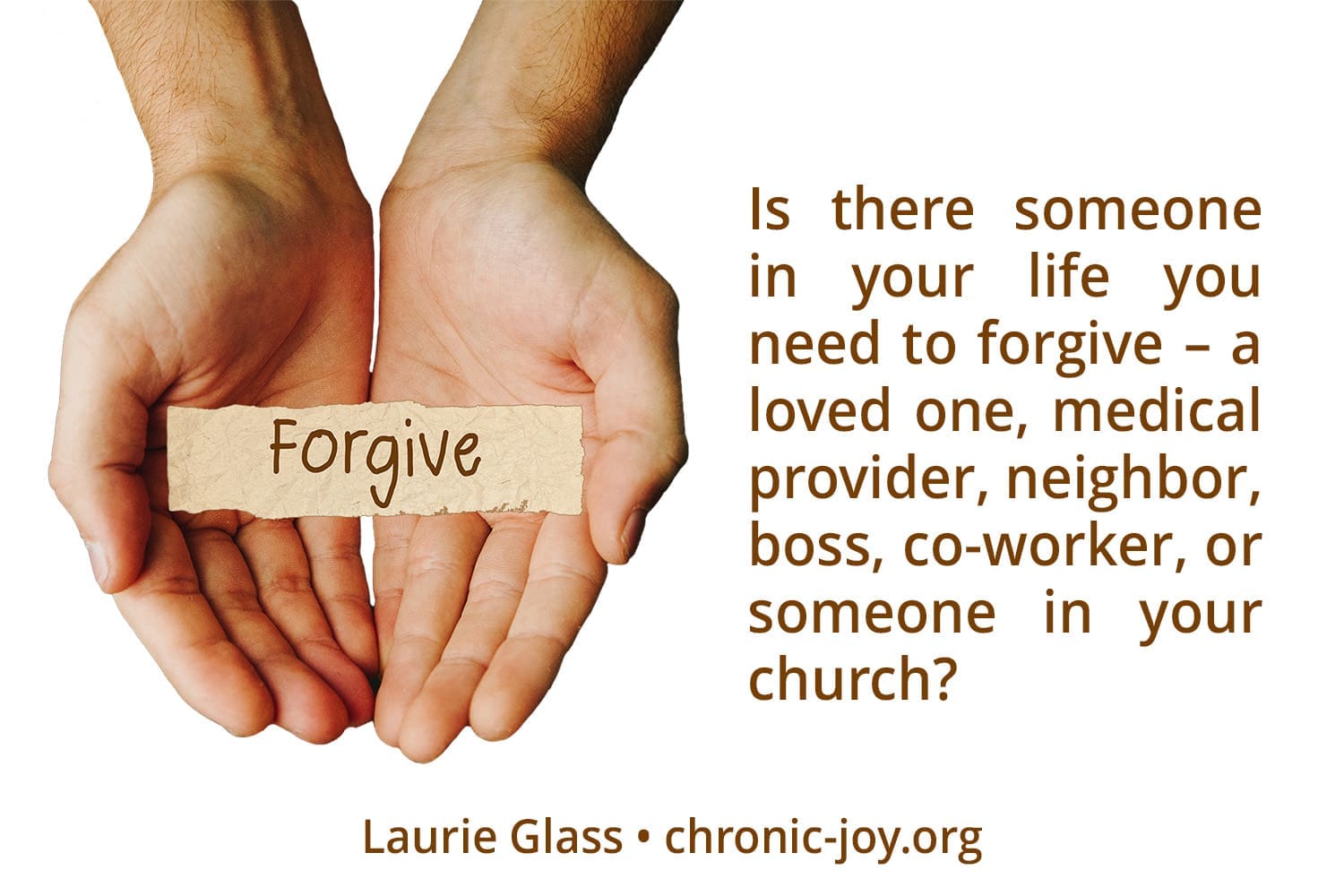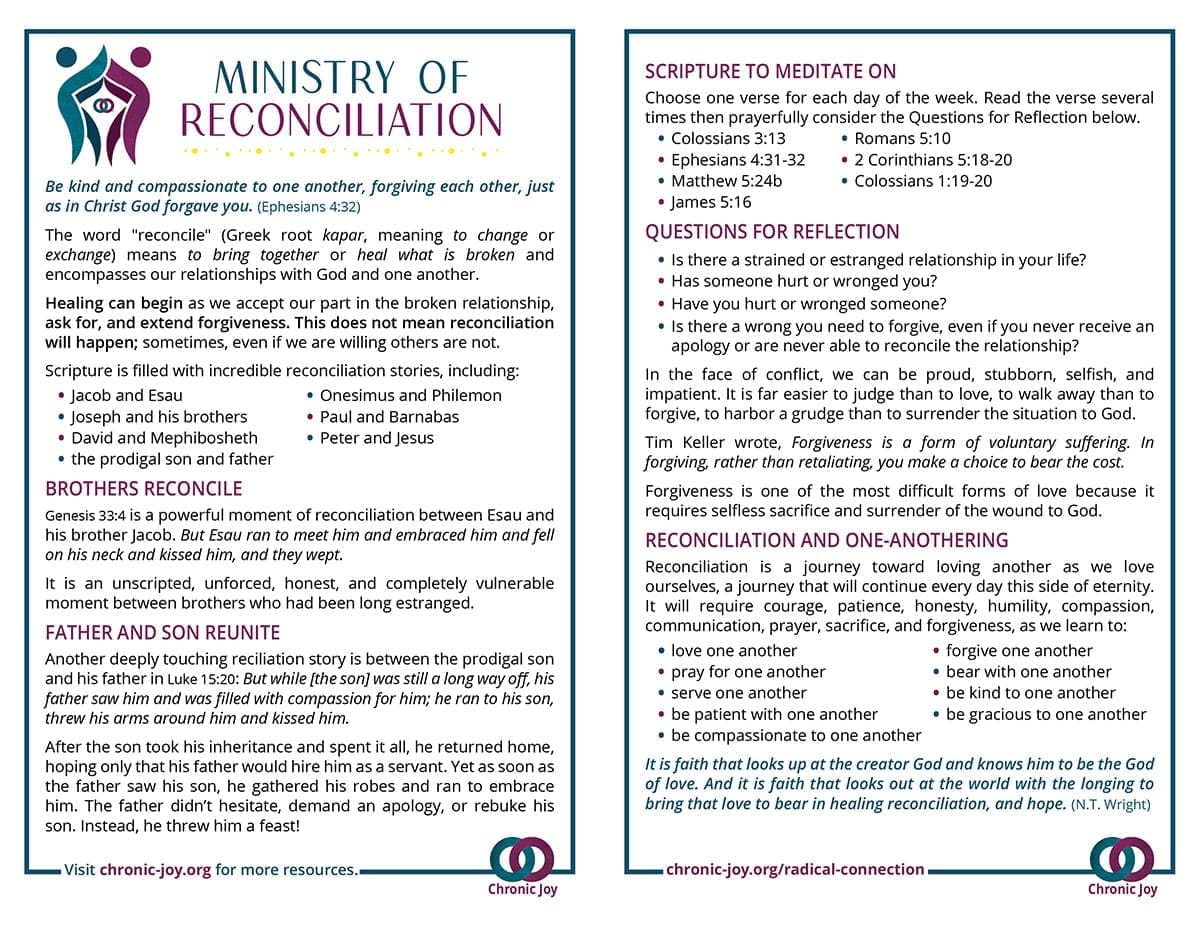
Is there someone in your life you need to forgive – a loved one, medical provider, neighbor, boss, co-worker, or someone in your church? (Laurie Glass)
THE NEED TO FORGIVE
Bear with each other and forgive one another if any of you has a grievance against someone. Forgive as the Lord forgave you. (Colossians 3:13)
Is there someone in your life you need to forgive? It may be a loved one, a medical provider, a boss, a co-worker, a neighbor, or someone in your church. Perhaps someone physically harmed you, violated your privacy, gossiped about you, disrespected you, or downplayed what you are going through as you live with a chronic illness.
If you are struggling with your need to forgive, you may also want to consider the emotional, mental, spiritual, and physical cost of not forgiving. Think of the inner pain, mental torment, lack of peace, and even physical symptoms you may feel due to bitterness. Realize that if you have a pattern of withholding forgiveness, you will likely hurt yourself more and more. The betrayal, disappointment, anger, or whatever emotions you feel will fester, and the pain will build from one circumstance to another. Forgive so you can heal.
Forgiving someone does not always come easily. For some offenses, it may happen relatively quickly, but perhaps not for deeper hurts or more severe violations. Consider some principles that promote forgiveness so you can work toward breaking free of what has happened to you. You will find that some of these points are more appropriate for minor offenses and some for more serious transgressions.
10 SUGGESTIONS TO HELP YOU FORGIVE
- Recognize that, in His love, God commands forgiveness: Bear with each other and forgive whatever grievances you may have against one another (Colossians 3:13). He knows that holding onto hurts will only continue to harm you.
- Reflect on God’s forgiveness of you and how He wants you to forgive others as He’s forgiven you. Be kind and compassionate to one another, forgiving each other, just as in Christ God forgave you (Ephesians 4:32). Think of it as an opportunity to become more Christ-like.
- Look to those in the Bible who forgave others of some horrific offenses. For example, Paul was a victim of persecution. Joseph was sold by his brothers (What betrayal!), yet Joseph said, ”You intended to harm me, but God intended it for good…” (Genesis 50:20a).
- Remember that God warns us not to retaliate: Do not take revenge, my friends, but leave room for God’s wrath, for it is written: “It is mine to avenge, I will repay,” says the Lord (Romans 12:19). You may not see what God has in mind for this person but know that what happened has not escaped His view. He knows. Also, if you try to get revenge, it could backfire on you, and you could be even more hurt.
- Recognize that someone hurt sometimes lashes out to hurt others. That is not to say this makes what the individual did okay. It does not—but consider that the same thing could happen to you. If you are hurt and become bitter, you could get to the point of wanting to hurt someone else, something you would never do if you were not hurting. Stop the cycle. Don’t let someone else’s actions toward you change you into someone who will hurt others.
- Work through the emotions associated with the offense while keeping your heart open to God’s healing and direction. He is there to love you through this process and heal you. Ultimately, you will end up with more of God, and He will have more of you.
- Break it down if need be. If you cannot absolve everything someone did to you, start by forgiving one offense and work from there. Certainly, the ultimate goal is complete forgiveness, but it is better to go about it in steps than to get overwhelmed and discouraged and not do it at all.
- Be honest with yourself. If you have chosen to forgive and then feel hurt and bitter all over again, do not bury those feelings. Acknowledge them, pray, and journal about them. Maybe you are still in the process of healing, or maybe there were numerous or horrific offenses. Perhaps you struggle to be sincere in forgiving. Explore what you think and how you feel. Discuss your concerns with a counselor, pastor, or someone else you trust—then choose to forgive again.
- Forgive as many times as it takes. If you forgive once and it doesn’t “stick,” don’t let that stop you from trying again.
- Pray for the person who has hurt you. Begin with a general prayer if that is all you can do. If you cannot bring yourself to do it, keep trying until you can. You might even write out a prayer to use later.
FORGIVENESS IS A PROCESS
Forgiving may seem impossible to do, but give yourself a chance. Actually, give yourself several chances because it might take many attempts. An added benefit of practicing forgiveness is that it may enhance your relationship with God and increase the peace and joy in your heart. When you experience the positive results of forgiving, you will be glad you made the effort.
AN INVITATION
For additional ideas and encouragement, see Chronic Joy’s Ministry of Reconciliation printable. Prayerfully consider who God is guiding you to forgive. Could it be yourself? Ask him to help you take the first brave step.


Laurie Glass
Laurie has a Master's Degree in Christian Counseling and is the author of Coping with ME/CFS. Many of her poems and articles have been published in print and online. In 2019, she won the Open Medicine Foundation poetry contest. Laurie loves to use her gift of writing to encourage others. Her book is available on Amazon.

Ministry of Reconciliation
The word "reconcile" (Greek root kapar, meaning to change or exchange) means to bring together or heal what is broken and encompasses our relationships with God and one another.

Recent Comments